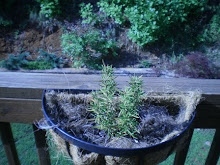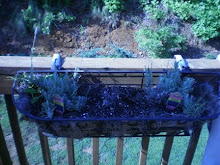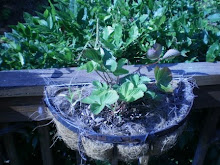Knowing that God is in all things because He is the creator, makes me excited to help her plant one and help keep it well, and because I know it is more special to her and her culture.....makes me even happier to help.
Poonam this article is for you!
1) Tulsi (Basil - Ocimum basilicum):
What is Tulsi?
Basil (Tulsi) has many health and medicinal benefits. It is about 3-5 feet tall. The leaves which are 3-5 cm long have powerful fragrance. Basil's are of three types-black basil, white basil and camphor basil. The flowering time of basil is winter and has seeds reddish-black in color.
On top of the list of our sacred plants is Tulsi or Basil, as it is known in the Western World. It is believed to b Lord Vishnu's consort, and is thus an inseparable part of any Puja to Lord Vishnu.
Tulsi has several medicinal properties, which include action against:
- Common Cold
- Headaches
- Malaria
- Skin Diseases
- Respiratory Disorders
- Cholesterol
- Kidney Stones
Tulsi Tea Benefits
Tulsi tea is a very important component of herbal teas and organic teas, which enhances a sense of well-being. Tulsi tea is a great stress buster and develops resistance against anxiety, tension and stress. It has good amount of antioxidants that helps to contend free radicals. It is one of the important alternatives of coffee and tea. Tulsi Tea good for vision, respiratory system, boost your immune system and stamina and maintain blood sugar level. There is no as such side-effects of Green Tea.
check out this link: http://davesgarden.com/
and here is another: http://www.
Here are some other uses and benefits of Tulsi:
Information from: http://www.gyanunlimited.com
Tulsi for Stress Management
Holy basil leaves are stress buster and mood elevator. Chewing of fresh Tulsi leaves deal with stress and helps in the management of tension and anxiety. Tulsi tea also helps in reducing stress. Chewing of 10-12 Tulsi leaves helps in controlling of stress.
Basil Reduces Fever
The decoction of basil leaves, neem leaves, powder of ginger and powder of long pepper has the ability to reduce fever and its symptoms considerably. Basil leaves tea is quite effective against malaria ad dengue fever, especially in the rainy season. During fever, the legs become cold then applying the paste of Tulsi leaves are beneficial.
Tulsi Prevents Heart Disease
Basil leaves show positive impact in reducing of cholesterol level in the body thereby helpful in prevention of cardiac diseases. Tulsi leaves also act as a tonic for heart. The flow of blood circulation enhances when juice of fresh leaves are applied locally.
Cough Home Remedy and Tulsi
Tulsi leaves are used as home remedy in the treatment of cough and cold. For curing of cough and cold fever, one should take the decoction of basil flowers, ginger, black powder and long pepper along with honey at least three to four times a day. Holy basil is also useful for chronic cough and cold. For this, one should take the mix of Basil leaves + mint + black pepper in the dose of 30 ml twice a day. It is good to reduces the symptoms of cough and cold. Person suffering from expectorant, take the juice of Basil leaves and sugar. For dry cough, the mixture of Tulsi leaves, onion and ginger juice is helpful in managing and controlling the case.
Basil Expels Kidney Stone
Tulsi juice drinking along with honey for a period of six months helps to expel the Kidney stone (calcium oxalate) via urinary tract. Tulsi acts like as a detoxifier thereby reduces the level of uric acid in the body. It also prevents the formation of calcium oxalate in the kidney. Calcium oxalate and uric acid compounds are responsible for the formation of Kidney Stone. Since holy basil has painkiller effect, it also reduces the impact of pain that causes due to stone in the kidney. Thus, Holy Basil can be used as home remedy treatment to expel kidney stone yet it takes time to show desire effect.
Tulsi Reduces Stomach Disorders
Basil show good impacts in case of stomach problems such as acidity, flatulence, constipation, etc. Sometimes hyperacidity leads to weakness; here Tulsi seeds cooked in water is given to overcome the problem. For acute stomach problems, decoction of basil leaves, ginger, honey and salt is given for two weeks. Recently, it has been shown in a scientific study that basil acts against stomach ulcers. For stomach-ache, the juice of basil leaves, lime and ginger is beneficial. It also eases from gaseous distension of stomach.
Basil and Dental Protection
Powder of Tulsi dry leaves is used as brushing of teeth, thus helps in teeth protection. It is also used as toothpaste when used with mustard oil. Mouth wash through basil leaves means keeping oneself away from many mouth diseases such as gums diseases, pyorrhoea, and other dental infections. To get relief from toothache, applied the mix of basil leaves juice and camphor. Chewing of Tulsi leaves is beneficial for mouth ulcer. It protects you from bacteria and germs that are the main source of mouth diseases.
Tulsi for Headache Treatment
Basil is helpful in relieving headache. To get instant relief from headache, it is suggested to apply the paste of Tulsi and Sandal wood on the forehead. Inhalation of powder of dried leaves of Basil eases from migraine and headache.
Tulsi Benefits for Skin Diseases
Tulsi is known as healing for many diseases and ailments. Juice of Tulsi leaves are used in the treatment ringworm and skin disorders. For skin problems, the mix of Tulsi and Aloe Vera is beneficial. Some physicians also used this beneficial herb for leucoderma cases. It is used as skin ointments.
Respiratory Diseases and Basil
The leaves of Tulsi are used as home remedy for the treatment of respiratory disorders such as cough, cold, influenza, mild-asthma and bronchitis. For these disorders, it is advisable to take the decoction of Basil leaves + honey and ginger. The mix of Tulsi leaves, common salt and cloves are also used in curing of influenza. A large number of Ayurvedic cough expectorant and syrups used basil as one of the ingredients. Chewing of Tulsi leaves are also beneficial in case of cold and flu. The asthma patient should take the mix of Tulsi juice and black pepper.
Top 10 Health Uses of Basil Leaves
- Tulsi is used as germicide, bactericide, deodorant, and anti-oedematous.
- Fresh juice of basil is instilled in ears to get relief from earache.
- Paste of basil and black pepper are used in case of insecticide.
- As a first aid, the paste of fresh leaves is used in case of bleeding.
- Basil juices along with honey remove hiccups.
- Basil extracted oil is used for painkiller.
- Basil leaves juice with honey is good for obese person. Obesity person should take this combination for a period of 2 to 3 months.
- The mix of Tulsi leaves and honey eases sore throat.
- Basil is very important for children as it acts like as weapon against cough, cold, diarrhea, vomiting, etc.
- Tulsi is good for sore eyes and night-blindness. To have good result, 1 to 2 drops of basil juice are put into eyes.
Precautions and Basil Leaves
The combination of basil and milk should be avoided. Basil and heated honey should not consume together.


























No comments:
Post a Comment